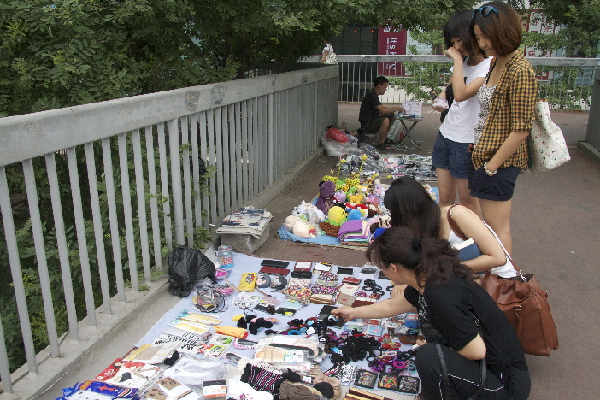Peddling for profit? Beijing's street vendors
- By Lauren Ratcliffe
 0 Comment(s)
0 Comment(s) Print
Print E-mail
China.org.cn, June 23, 2011
E-mail
China.org.cn, June 23, 2011
Most vendors earn about 100 ($15.47) yuan per day, but with the cost of living on the rise, living is hard. Weather often dictates how much they can earn because they can’t set up stalls in the rain. If it is too hot or cold, customers don't stop to bargain.
"I have to earn between 50 and 100 yuan per day because I have a daughter," Tang said. "I have to rent an apartment, eat, get clothes and – all these things cost money."
Yang said his average income is 2,000 yuan ($309) a month.
Vendors aren't just facing small incomes and Mother Nature. They're up against the law enforcement, too.
If caught by local authorities known as the Chengguan, vendors lose the goods they're selling, the most common consequence – and may be slapped with fines up to 5,000 yuan ($773.66).
Yang said the Chengguan are among the biggest fears vendors face.
"In China, it is illegal to be a street vendor, but I have to be a vendor to earn money," he said. "If the Chengguan comes, I have to escape."
|
Tang shows potential customers the variety of trinkets she’s selling. On an average day, she’ll earn 100 yuan. |
The statute prohibiting street vending comes from the Beijing City Environmental Health Regulations passed in 2006. Article 35 prohibits any individual from occupying urban roads, pedestrian overpasses and other public places to set up stalls. It also limits street commerce to the confines of shops. But those with permits from the Beijing Administration of Industry and Commerce can operate without fear.
Yang said he understands that what he's doing is against the law, but hopes that the laws will change or that the authorities will help him register to sell the goods legally.
"If the government doesn’t help us I hope the Chengguan will give me a break," he said with a chuckle.
Lian Jing, a 30-year-old fruit vendor, is working with a permit. She sells fruit at a busy intersection in a smaller community in the Haidian District of Beijing.
"I got (my permit) with the help of friends about two years ago," she said.
Vendors hoping to get permits can download a form from the Industry and Commerce Administration website. The site does not list any details about the process.
Whether legal or illegal, vendors agree that working on the street is better than not working at all.
Those without permits say they will continue to set up their stations and keep a watchful eye for the Chengguan, so they can run at a moment’s notice and continue to peddle their trinkets in the hope of something more.






